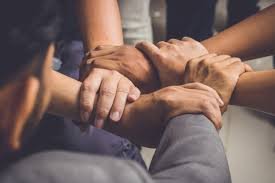Why would someone do that?
In recent years – more than ever before – I hear the news and ask: “Why would someone DO that?” It doesn’t make sense to me. Why would “a rational person” act that way? What has happened to “common sense”?
Our national divisions do not come so much from different ideas or policies. Rather they come out of different stories we believe are true. If we don’t know someone’s story, we can’t understand why people do what they do. Their story is not just their personal experiences, but the larger story of what they expect from the world in which they live.
Hope for any resolution of our conflicts, for reconciliation of relationships, comes from listening to others and learning the stories that give meaning to their lives. When we imagine what the world will be like in the future, we see a world very much like the story we believe is true about what the world is like, even what it “should” be like.
Do we see the world as a dangerous place where we are motivated by fear of others and what might happen to us? Are we driven by a sense of helplessness, of being left out of the affluence we see around us – and a deep-seated anger about it all? Is it “necessary” for someone to take control, to have power over others and enforce what’s “right”? If that’s the story we believe to be true, then “common sense” tells us that we need to take it back and we need someone to stand up for us against “the enemy.” Or ….
Do we see the world as a place where peace is possible, where people can work together for a better future for us all? Are we compelled by a sense of hope and compassion for people, with a desire to share power, to cooperate for mutual benefit? Does our story of what the world is like consider diversity of cultures, language, and religions a good thing? If that’s the story we believe to be true, then “common sense” tells us that we’re all in this together and there are no “enemies.”
The world is, of course, a mixture of all of this. None of us is all one or the other. Sometimes we tell one story; another time we tell the other. At times, we are afraid and feel helpless; and at times, we are hopeful that together we can do what needs to be done for a better world. I am convinced, though, that most of us lean toward one story as more true and more to be desired than the other – and that our words and actions come out of one story more than the other.
When we do not understand why someone would DO that – whatever it is – it’s important to listen and identify their basic story. How we see the world determines how we live – as a place of fear or hope, of control or cooperation, of antipathy or empathy, of enemies or potential friends we can learn to live with and work together with for that better world.




